We are thrilled to be able to bring to you all 8 talks from Ripperologist Magazine’s 21st birthday conference that took place at the Chamberlain Hotel in London over the weekend of the 3rd and 4th of September 2016.
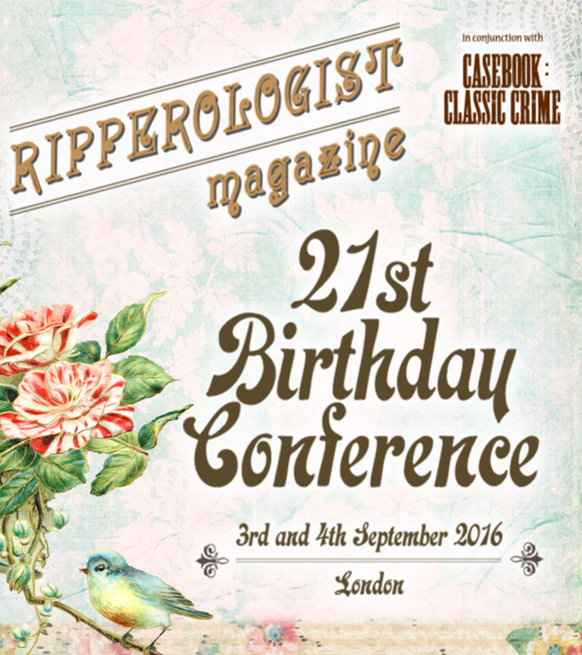
Day One:
Drew Gray is a historian of 18th and 19th century social history, specialising in the history of crime and punishment. He teaches at the university of Northampton, where he is course leader for the BA (Honours) degree. Drew is a member of the London Journal editorial board, the London Historians group and a Fellow of the Royal Historical Society.
Drew's talk, titled POLICING WHITECHAPEL: THE ROLE OF THE THAMES POLICE COURT IN THE 1880s, will look at the everyday nature of crime in the East End, and examine how the East Arbour Street court operated and the role it played in keeping order and discipline in the area.
He has published numerous articles and three books including one, "London’s Shadows; the Dark Side of the Victorian City" (Bloomsbury, 2010) which uses the Whitechapel murders of 1888 as a focus for studying crime, poverty and a number of related themes. His most recent book is an undergraduate level textbook, "Crime, Policing & Punishment in England, 1660-1914". Drew has been researching the ‘Ripper’ murders for several years and intends to offer his own ‘thesis’ in due course.
He is a Londoner and has recently returned to live in the capital. When not writing, researching or teaching he can usually be found watching the Arsenal.

Listen to Drew Gray: http://www.casebook.org/podcast/listen.html?id=143
Having worked in book publishing for many years, Maxim Jakubowski opened the world-famous Murder One bookshop on London's Charing Cross Road in 1988 which for more then 20 years was the largest specialist crime bookshop in Europe. For 20 years the crime reviewer for The Guardian.
Maxim presently sits on the committee of the Crime Writers’ Association, and chairs its panel of judges for the John Creasey Dagger for Best First Novel of the Year.
In 1999 Maxim edited The Mammoth Book of Jack the Ripper with Nathan Braund, updated in 2008. In 2015 Maxim edited The Mammoth Book of Jack the Ripper Stories, a collection of 40 new fictional takes on the Whitechapel murders from a range of leading writers.
Maxim also edited 100 Great Detectives, which won the Anthony Award for 1994. More recently he edited Following the Detectives, which looked at the locations of 20 of crime fiction's leading investigators, including the London of Sherlock Holmes and Maigret's Paris.
In his talk, Maxim will be looking at the continued passion for fictional crime and detection, and attitudes to fictional treatments of the Ripper case in particular.

Listen to Maxim Jakubowski: http://www.casebook.org/podcast/listen.html?id=142
Chris Payne was a late-developer as far as Crime is concerned. He spent most of his working life as a research scientist specialising in pest control. However, having discovered that he had ancestral connections with a senior detective at Scotland Yard in the Victorian era, Detective Chief Inspector George Clarke, he decided to research and write about his ancestor’s activities.
Clarke’s investigations involved a strong element of ‘pest control’ of a more radical kind, including the hunting down of murderers, several of whom were tried, convicted and hanged.
Chris Payne’s book about Clarke, ‘The Chieftain’ illustrates that some Scotland Yard detectives were not invariably the bumbling, and unsuccessful agents of the Crown that have been portrayed in many fictional accounts of Victorian crime.
His talk will consider some of the most significant of Clarke’s cases and Clarke’s personal involvement in the 1877 ‘Trial of Detectives’, which stimulated a radical reorganisation of the Detective force within the Metropolitan Police.

Listen to Chris Payne: http://www.casebook.org/podcast/listen.html?id=141
We are delighted to announce that the legendary television and film writer, director and producer David Wickes has been confirmed as part of the Casebook: Classic Crime “Watching the Detectives” theme at the Conference.
David has worked on numerous detective dramas including Public Eye, Softly Softly: Task Force, Special Branch, Van Der Valk, The Sweeney, The Professionals and Philip Marlowe, Private Eye.
In 1973 David took the popular Softly Softly characters Barlow and Watt and placed them in Whitechapel as they attempted to solve the Ripper murders in the acclaimed Jack the Ripper, and in 1988 directed and co-wrote the mini-series Jack the Ripper starring Michael Caine.
In his talk, David will discuss his ongoing interest in the detective, and how this shaped his vision of the work of the detectives in his Ripper output.
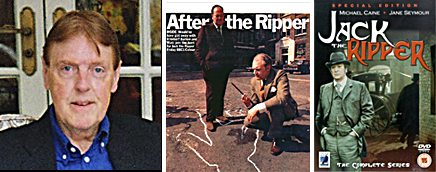
Listen to David Wickes: http://www.casebook.org/podcast/listen.html?id=140
****

Day One:
Drew Gray is a historian of 18th and 19th century social history, specialising in the history of crime and punishment. He teaches at the university of Northampton, where he is course leader for the BA (Honours) degree. Drew is a member of the London Journal editorial board, the London Historians group and a Fellow of the Royal Historical Society.
Drew's talk, titled POLICING WHITECHAPEL: THE ROLE OF THE THAMES POLICE COURT IN THE 1880s, will look at the everyday nature of crime in the East End, and examine how the East Arbour Street court operated and the role it played in keeping order and discipline in the area.
He has published numerous articles and three books including one, "London’s Shadows; the Dark Side of the Victorian City" (Bloomsbury, 2010) which uses the Whitechapel murders of 1888 as a focus for studying crime, poverty and a number of related themes. His most recent book is an undergraduate level textbook, "Crime, Policing & Punishment in England, 1660-1914". Drew has been researching the ‘Ripper’ murders for several years and intends to offer his own ‘thesis’ in due course.
He is a Londoner and has recently returned to live in the capital. When not writing, researching or teaching he can usually be found watching the Arsenal.

Listen to Drew Gray: http://www.casebook.org/podcast/listen.html?id=143
Having worked in book publishing for many years, Maxim Jakubowski opened the world-famous Murder One bookshop on London's Charing Cross Road in 1988 which for more then 20 years was the largest specialist crime bookshop in Europe. For 20 years the crime reviewer for The Guardian.
Maxim presently sits on the committee of the Crime Writers’ Association, and chairs its panel of judges for the John Creasey Dagger for Best First Novel of the Year.
In 1999 Maxim edited The Mammoth Book of Jack the Ripper with Nathan Braund, updated in 2008. In 2015 Maxim edited The Mammoth Book of Jack the Ripper Stories, a collection of 40 new fictional takes on the Whitechapel murders from a range of leading writers.
Maxim also edited 100 Great Detectives, which won the Anthony Award for 1994. More recently he edited Following the Detectives, which looked at the locations of 20 of crime fiction's leading investigators, including the London of Sherlock Holmes and Maigret's Paris.
In his talk, Maxim will be looking at the continued passion for fictional crime and detection, and attitudes to fictional treatments of the Ripper case in particular.

Listen to Maxim Jakubowski: http://www.casebook.org/podcast/listen.html?id=142
Chris Payne was a late-developer as far as Crime is concerned. He spent most of his working life as a research scientist specialising in pest control. However, having discovered that he had ancestral connections with a senior detective at Scotland Yard in the Victorian era, Detective Chief Inspector George Clarke, he decided to research and write about his ancestor’s activities.
Clarke’s investigations involved a strong element of ‘pest control’ of a more radical kind, including the hunting down of murderers, several of whom were tried, convicted and hanged.
Chris Payne’s book about Clarke, ‘The Chieftain’ illustrates that some Scotland Yard detectives were not invariably the bumbling, and unsuccessful agents of the Crown that have been portrayed in many fictional accounts of Victorian crime.
His talk will consider some of the most significant of Clarke’s cases and Clarke’s personal involvement in the 1877 ‘Trial of Detectives’, which stimulated a radical reorganisation of the Detective force within the Metropolitan Police.

Listen to Chris Payne: http://www.casebook.org/podcast/listen.html?id=141
We are delighted to announce that the legendary television and film writer, director and producer David Wickes has been confirmed as part of the Casebook: Classic Crime “Watching the Detectives” theme at the Conference.
David has worked on numerous detective dramas including Public Eye, Softly Softly: Task Force, Special Branch, Van Der Valk, The Sweeney, The Professionals and Philip Marlowe, Private Eye.
In 1973 David took the popular Softly Softly characters Barlow and Watt and placed them in Whitechapel as they attempted to solve the Ripper murders in the acclaimed Jack the Ripper, and in 1988 directed and co-wrote the mini-series Jack the Ripper starring Michael Caine.
In his talk, David will discuss his ongoing interest in the detective, and how this shaped his vision of the work of the detectives in his Ripper output.

Listen to David Wickes: http://www.casebook.org/podcast/listen.html?id=140
****

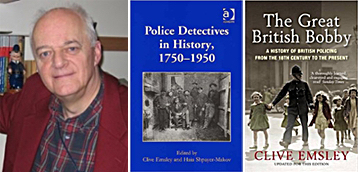
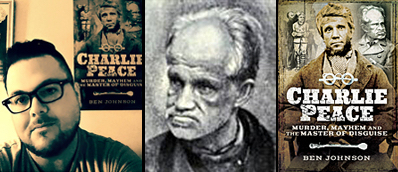
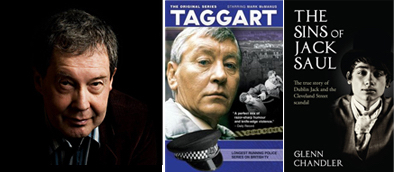
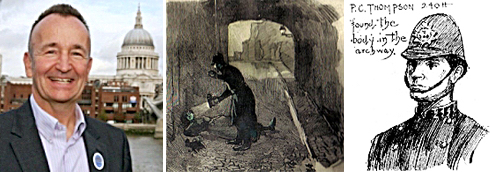


Comment